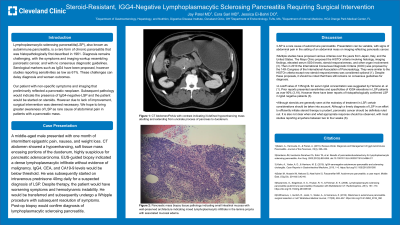Sunday Poster Session
Category: Biliary/Pancreas
P0064 - Steroid-Resistant, IGG4-Negative Lymphoplasmacytic Sclerosing Pancreatitis Requiring Surgical Intervention
Sunday, October 22, 2023
3:30 PM - 7:00 PM PT
Location: Exhibit Hall

Has Audio
- JP
Jay Patel, MD
Orange Park Medical Center
Cleveland, OH
Presenting Author(s)
Jay Patel, MD1, Esra Sari, MD2, Jessica El-Bahri, DO1
1Orange Park Medical Center, Jacksonville, FL; 2Orange Park Medical Center, Orange Park, FL
Introduction: Lymphoplasmacytic sclerosing pancreatitis(LSP), also known as autoimmune pancreatitis, is a rare form of chronic pancreatitis that was histopathologically first described in 1961. Diagnosis remains challenging, with the symptoms and imaging workup resembling pancreatic cancer, and with no consensus diagnostic guidelines. Serological markers such as IgG4 have been proposed, however studies reporting sensitivities as low as 61%. These challenges can delay diagnosis and worsen outcomes.
Our patient presented with non-specific symptoms and imaging that preliminarily reflected a pancreatic neoplasm. Subsequent pathology would indicate the presence of IgG4-negative-LSP and the patient would be started on steroids. However due to lack of improvement, surgical intervention was deemed necessary.
Case Description/Methods: A middle-aged male presented with one month of intermittent epigastric pain, nausea, and weight loss. CT abdomen showed a hypoenhancing soft tissue mass encasing portions of the duodenum, highly suspicious for pancreatic adenocarcinoma. EUS-guided biopsy indicated a dense lymphoplasmacytic infiltrate without evidence of malignancy. IgG4, CEA, and CA19-9 levels would be below threshold. He was subsequently started on intravenous prednisone 40mg daily for a suspected diagnosis of LSP. Despite therapy, the patient would have worsening symptoms and hemodynamic instability. He would be transferred and subsequently undergo a Whipple procedure with subsequent resolution of symptoms.
Discussion: LSP, due to its rare presentation, is often misdiagnosed as pancreatic cancer. Diagnosis remains challenging with no consensus diagnostic criteria. Steroid responsiveness is no longer considered diagnostic, with lack of qualifying data. Elevation of IgG4 can be observed. However there have been reports of histopathologically-confirmed LSP in IgG4 negative patients. As a result, IgG4 alone cannot be used to diagnose LSP. Pathology, therefore remains crucial in diagnosis with cancer being essential to rule out.
LSP is generally responsive to steroid therapy, generally requiring two-to-four weeks of treatment. There are no consensus guidelines on what defines remission, with experts' opinions including resolution of imaging findings, reduction in symptoms, and improvement in laboratory values. If symptoms do not improve, prior reports indicate that surgical resection is crucial to improve outcomes. We hope to bring greater awareness of LSP as rare cause of abdominal pain in patients with a pancreatic mass.

Disclosures:
Jay Patel, MD1, Esra Sari, MD2, Jessica El-Bahri, DO1. P0064 - Steroid-Resistant, IGG4-Negative Lymphoplasmacytic Sclerosing Pancreatitis Requiring Surgical Intervention, ACG 2023 Annual Scientific Meeting Abstracts. Vancouver, BC, Canada: American College of Gastroenterology.
1Orange Park Medical Center, Jacksonville, FL; 2Orange Park Medical Center, Orange Park, FL
Introduction: Lymphoplasmacytic sclerosing pancreatitis(LSP), also known as autoimmune pancreatitis, is a rare form of chronic pancreatitis that was histopathologically first described in 1961. Diagnosis remains challenging, with the symptoms and imaging workup resembling pancreatic cancer, and with no consensus diagnostic guidelines. Serological markers such as IgG4 have been proposed, however studies reporting sensitivities as low as 61%. These challenges can delay diagnosis and worsen outcomes.
Our patient presented with non-specific symptoms and imaging that preliminarily reflected a pancreatic neoplasm. Subsequent pathology would indicate the presence of IgG4-negative-LSP and the patient would be started on steroids. However due to lack of improvement, surgical intervention was deemed necessary.
Case Description/Methods: A middle-aged male presented with one month of intermittent epigastric pain, nausea, and weight loss. CT abdomen showed a hypoenhancing soft tissue mass encasing portions of the duodenum, highly suspicious for pancreatic adenocarcinoma. EUS-guided biopsy indicated a dense lymphoplasmacytic infiltrate without evidence of malignancy. IgG4, CEA, and CA19-9 levels would be below threshold. He was subsequently started on intravenous prednisone 40mg daily for a suspected diagnosis of LSP. Despite therapy, the patient would have worsening symptoms and hemodynamic instability. He would be transferred and subsequently undergo a Whipple procedure with subsequent resolution of symptoms.
Discussion: LSP, due to its rare presentation, is often misdiagnosed as pancreatic cancer. Diagnosis remains challenging with no consensus diagnostic criteria. Steroid responsiveness is no longer considered diagnostic, with lack of qualifying data. Elevation of IgG4 can be observed. However there have been reports of histopathologically-confirmed LSP in IgG4 negative patients. As a result, IgG4 alone cannot be used to diagnose LSP. Pathology, therefore remains crucial in diagnosis with cancer being essential to rule out.
LSP is generally responsive to steroid therapy, generally requiring two-to-four weeks of treatment. There are no consensus guidelines on what defines remission, with experts' opinions including resolution of imaging findings, reduction in symptoms, and improvement in laboratory values. If symptoms do not improve, prior reports indicate that surgical resection is crucial to improve outcomes. We hope to bring greater awareness of LSP as rare cause of abdominal pain in patients with a pancreatic mass.

Figure: Pancreatic mass biopsy tissue pathology indicating small intestinal mucosa with well-preserved architecture indicating mixed lymphoplasmacytic infiltrate in the lamina propria with associated mucosal edema.
Disclosures:
Jay Patel indicated no relevant financial relationships.
Esra Sari indicated no relevant financial relationships.
Jessica El-Bahri indicated no relevant financial relationships.
Jay Patel, MD1, Esra Sari, MD2, Jessica El-Bahri, DO1. P0064 - Steroid-Resistant, IGG4-Negative Lymphoplasmacytic Sclerosing Pancreatitis Requiring Surgical Intervention, ACG 2023 Annual Scientific Meeting Abstracts. Vancouver, BC, Canada: American College of Gastroenterology.
